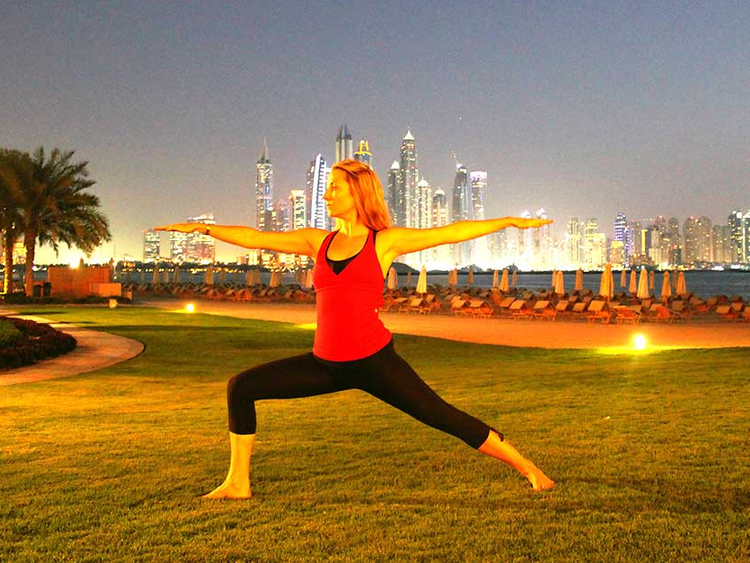Commuting on some of the busy roads in Dubai can sometimes leave us feeling angry and uptight. However, a regular yoga practice can help us reduce the anger that might build as we travel around, not only in the wonderful city of Dubai, but almost anywhere in the world.
Usually, when someone experiences anger or "road rage", it is not solely the result of the immediate action on the road like someone maneuvering in a less than favourable way.
It can be an accumulation of other life factors and stressors that cause us to become agitated resulting in an outburst or feelings of anger. As I am often driving around Dubai, road rage is particularly interesting to me as it relates directly to what we practice in yoga.

Yoga guru Kate Kowalski of Fairmont The Palm.
During our daily lives, we can all experience feelings of upset and anger so the important key is to try to learn how to manage these emotions. The remedy to these feelings can be found in our yoga practice, as well as in our ability to incorporate the techniques that yoga teaches us when we are in the upsetting or "rageful" situation.
While yoga cannot completely eliminate stress it does provide tools for dealing with the associated pressures. The work on how to deal with anger and stress commences on the yoga mat.
Yoga teaches us to be mindful and to observe; to let go and to breathe. These are all techniques that anyone can practice during any times of upset, anger and stress. Indeed, the same applies for any aggravating or stressful situation.
For example, many people feel stressed or uptight at work. You may be pressured to finish a project, meet an urgent deadline or to give a daunting presentation. Yoga and meditation can also help you to manage these feelings of stress and worry.

Full moon yoga session at Fairmont The Palm in Dubai.
Here are some yoga moves to help you keep your cool:
Pranayama: An important area to focus on is your breath. In yoga, control of the breath and Pranayama (the formal practice of controlling the breath), allows us to reduce anxiety and depression, lower blood pressure, increase energy levels, relax our muscles and decrease feelings of stress when we are overwhelmed.
While the most beneficial way to practice pranayama correctly is under the guidance of an experienced teacher, there are simple breathing techniques that can be used in the car or at your desk which can help you to steady your breath and in turn help with your state of mind.
When we are afraid, rageful or stressed, (for example, when we are in traffic or at work) we often breathe more quickly or gasp—inhaling and then holding the breath. This breathing can activate the sympathetic nervous system - often referred to as the “fight or flight response” - making us feel more highly alert and perhaps more agitated.
Pranayama is useful during these times because the techniques help us to cultivate a longer, smoother exhale. This is beneficial because it can help to support the parasympathetic nervous system, reducing stress and its effects on your mind and in turn, your body.

Full moon yoga session at Fairmont The Palm in Dubai.
The outcome of this is that our ability to deal with challenging situations becomes a little easier and therefore your mind becomes more focused and still. The next time you are caught up in rush hour traffic or feel uptight in the office practice applying the things you are learning from your yoga and meditation.
Try to slow your breath and breathe into what you are feeling. Concentrate on lengthening the exhale. Breathe into the intensity of the situation as though you’re on your mat holding a yoga posture. You can also use this simple breathing technique when you are navigating traffic (However, please remember to keep your eyes on the road and drive safely while doing so!):
Lengthen your exhale: This 1:2 breathing practice involves gradually increasing your exhalation until it is twice the length of your inhalation. Once your inhalation and exhalation are equal, begin to increase the length of your exhalation by 1 to 2 seconds.
When the breath feels relaxed, continue increasing the exhale by another 1-2 seconds. It is important that the exhale is smooth and effortless so don't force the lengthening. If this is so, keep going until your exhalation is twice the length of the inhalation. e.g. if your inhalation is 4 seconds, the exhalation length should not be increased to more than 8 seconds. You should find that increasing the length of your exhale has a calming effect.
Accepting the situation: Alongside this technique, try to accept the situation as it is. Practice letting go of your reaction and your judgment of the situation. You may not be able to change the immediate situation but you can control your reaction to it and how much you let it impact on your day. Observe your feelings and reactions. It really doesn’t matter if you get annoyed; the traffic isn’t going to move any faster!
Regular breaks: Sitting at a desk for hours on end places strain on the lumbar spine, overstretches the mid to upper back—leading to neck, shoulder, and low back pain. Prolonged work periods can also make us feel "stressed" and uptight. It is important to take regular breaks during your working day.
Incorporate half an hour of yoga into your work schedule: You may also like to have a yoga teacher come into the office for 1/2 an hour once a week. As well as helping with individual stress management yoga also improves the immune system and overall health, resulting in decreased absenteeism and sickness levels. Regular yoga sessions increase productivity, motivation and work performance. Adding yoga into your employees’ schedules improves decision making and creativity and increases energy and mental alertness.
So remember, when you are feeling worried, anxious or stressed at any time whether it be driving or working. Take time to practice your breathing and if it is safe to do so, to do a few yoga poses (like those mentioned above). Remember, it is your practice and you can take your yoga with you wherever you go. Be safe out there on the roads and happy yoga!
Catch Kate Kowalski's yoga classes every Monday at 7pm at Fairmont The Palm. Call 04 4573330 or email Palm.Healthclub@Fairmont.com












